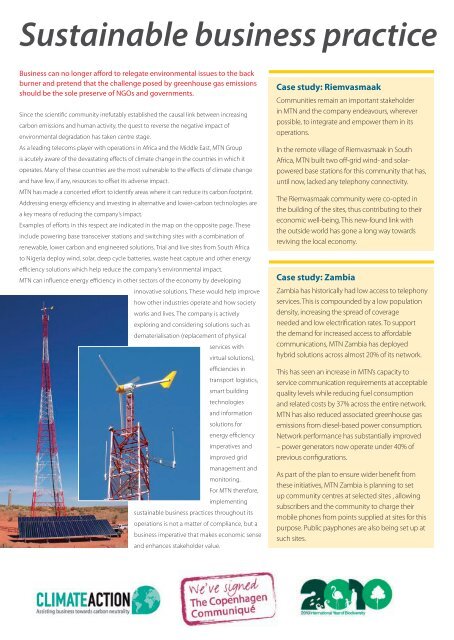Climate Action 2010-2011
You also want an ePaper? Increase the reach of your titles
YUMPU automatically turns print PDFs into web optimized ePapers that Google loves.
Sustainable business practice<br />
Business can no longer afford to relegate environmental issues to the back<br />
burner and pretend that the challenge posed by greenhouse gas emissions<br />
should be the sole preserve of NGOs and governments.<br />
Since the scientific community irrefutably established the causal link between increasing<br />
carbon emissions and human activity, the quest to reverse the negative impact of<br />
environmental degradation has taken centre stage.<br />
As a leading telecoms player with operations in Africa and the Middle East, MTN Group<br />
is acutely aware of the devastating effects of climate change in the countries in which it<br />
operates. Many of these countries are the most vulnerable to the effects of climate change<br />
and have few, if any, resources to offset its adverse impact.<br />
MTN has made a concerted effort to identify areas where it can reduce its carbon footprint.<br />
Addressing energy efficiency and investing in alternative and lower-carbon technologies are<br />
a key means of reducing the company’s impact.<br />
Examples of efforts in this respect are indicated in the map on the opposite page. These<br />
include powering base transceiver stations and switching sites with a combination of<br />
renewable, lower carbon and engineered solutions. Trial and live sites from South Africa<br />
to Nigeria deploy wind, solar, deep cycle batteries, waste heat capture and other energy<br />
efficiency solutions which help reduce the company’s environmental impact.<br />
MTN can influence energy efficiency in other sectors of the economy by developing<br />
innovative solutions. These would help improve<br />
how other industries operate and how society<br />
works and lives. The company is actively<br />
exploring and considering solutions such as<br />
dematerialisation (replacement of physical<br />
services with<br />
virtual solutions),<br />
efficiencies in<br />
transport logistics,<br />
smart building<br />
technologies<br />
and information<br />
solutions for<br />
energy efficiency<br />
imperatives and<br />
improved grid<br />
management and<br />
monitoring.<br />
For MTN therefore,<br />
implementing<br />
sustainable business practices throughout its<br />
operations is not a matter of compliance, but a<br />
business imperative that makes economic sense<br />
and enhances stakeholder value.<br />
Case study: Riemvasmaak<br />
Communities remain an important stakeholder<br />
in MTN and the company endeavours, wherever<br />
possible, to integrate and empower them in its<br />
operations.<br />
In the remote village of Riemvasmaak in South<br />
Africa, MTN built two off-grid wind- and solarpowered<br />
base stations for this community that has,<br />
until now, lacked any telephony connectivity.<br />
The Riemvasmaak community were co-opted in<br />
the building of the sites, thus contributing to their<br />
economic well-being. This new-found link with<br />
the outside world has gone a long way towards<br />
reviving the local economy.<br />
Case study: Zambia<br />
Zambia has historically had low access to telephony<br />
services. This is compounded by a low population<br />
density, increasing the spread of coverage<br />
needed and low electrification rates. To support<br />
the demand for increased access to affordable<br />
communications, MTN Zambia has deployed<br />
hybrid solutions across almost 20% of its network.<br />
This has seen an increase in MTN’s capacity to<br />
service communication requirements at acceptable<br />
quality levels while reducing fuel consumption<br />
and related costs by 37% across the entire network.<br />
MTN has also reduced associated greenhouse gas<br />
emissions from diesel-based power consumption.<br />
Network performance has substantially improved<br />
– power generators now operate under 40% of<br />
previous configurations.<br />
As part of the plan to ensure wider benefit from<br />
these initiatives, MTN Zambia is planning to set<br />
up community centres at selected sites , allowing<br />
subscribers and the community to charge their<br />
mobile phones from points supplied at sites for this<br />
purpose. Public payphones are also being set up at<br />
such sites.












